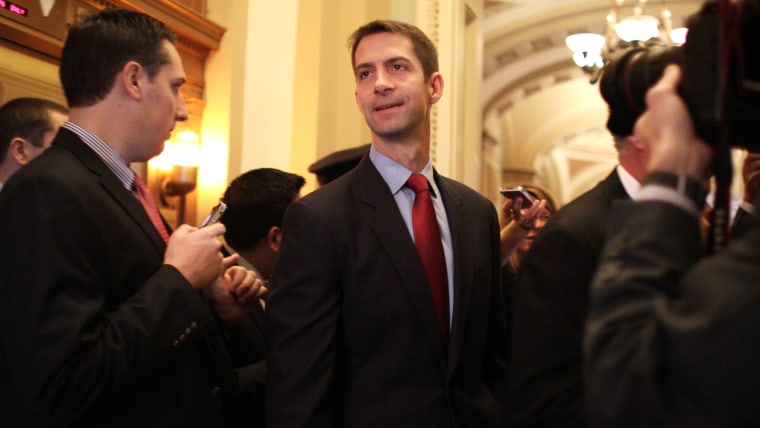It was about a month ago when Senate Majority Leader Mitch McConnell (R-Ky.) started publicly warning U.S. negotiating partners around the world about climate negotiations. Foreign nations should "
proceed with caution," the Republican senator said, before reaching an agreement with the United States about reducing carbon emissions -- President Obama may
say we'll reach our goals, McConnell said, but the world should be skeptical of America's word.
As we
talked about at the time, it's become a familiar gambit for GOP senators. Just a couple of weeks earlier, Sen. Tom Cotton (R-Ark.) and 46 of his Republican pals also publicly warned a foreign nation not to consider the United States trustworthy in the context of an entirely different set of international diplomatic negotiations.
When McConnell duplicated the strategy on climate, a Sierra Club official said McConnell had effectively "stolen Tom Cotton's playbook for undermining American leadership in the face of international crises."
But it's not just McConnell. The
Wall Street Journal reported today:
President Barack Obama and Congress are headed for another power clash on the international stage, as key Senate Republicans challenge his efforts to forge a global pact on climate change. The White House considers the agreement with nearly 200 nations a historic opportunity to reduce greenhouse-gas emissions world-wide. But some GOP senators view it as executive overreach, and they are quietly considering ways to warn other countries that the president doesn't speak for them and may not be able to deliver on his promises to slash emissions.
Sen. James Inhofe (R-Okla.), one of the nation's most aggressive climate deniers and the man Senate Republicans chose to lead the Senate committee on environmental policy, wasn't subtle when describing his sabotage ambitions.
"The Tom Cotton letter was an educational effort,"
Senator Snowball told the
WSJ.
The core question of whether Obama has the authority to carry out the EPA rules that will be crucial to making an international deal work will eventually be decided in court (his authority to negotiate the deal itself could conceivably be tested in court, too). But these GOP moves appear to be about more than just legal differences over the president's authority and more than merely an effort to assert more Congressional oversight over the process, a legitimate goal unto itself. Rather, just as on Iran, the moves also appear designed to sow uncertainty abroad, in hopes of imperiling Obama's ability to negotiate the deal itself. Indeed, the Journal story claims that "many Republicans" see this as a "potential avenue" to "complicate negotiations of the international agreement."
We've grown quite accustomed to congressional Republicans causing deliberate gridlock on Capitol Hill. Increasingly, however, GOP lawmakers are equally eager to block policymaking on a global scale.
Of course, in the American tradition, the idea of elected American officials trying to sabotage American foreign policy, on purpose, brazenly undermining our nation's attempts at international leadership, seems plainly ridiculous. But in 2015, it's become an increasingly common Republican tactic.
Finally, it's important to remember that these GOP efforts are starting to have their desired effect. As we
discussed last week, U.S. special envoy for climate change Todd Stern conceded that foreign officials, mindful of Republican climate deniers, have begun pressing him on whether the United States can keep its commitments. "I wouldn't say it's a big drumbeat," Stern said, "but I have definitely been asked that."
Republicans want the United States to be able to lead the free world -- except when they don't.
